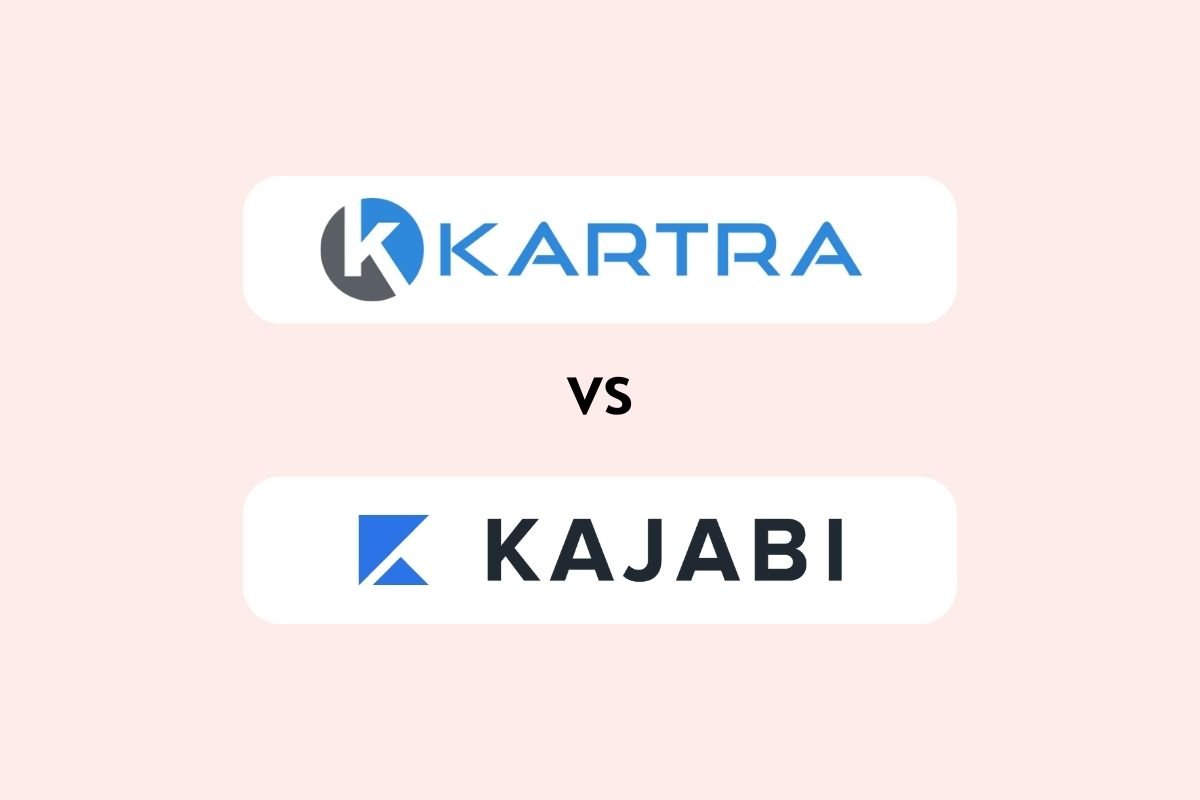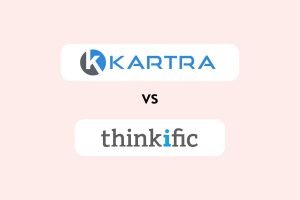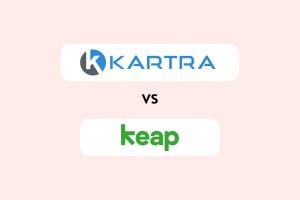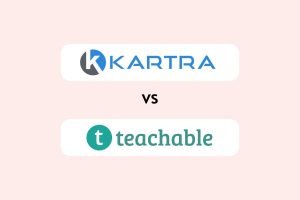Last updated on March 15, 2024
If you’re a coach stepping into the online world, you’ve likely come across Kartra and Kajabi. They’re big names for good reasons, offering a bunch of tools to help you launch, market, and manage your services.
But, with all the marketing fluff out there, it’s hard to tell which one is actually going to fit your needs. Is it Kartra, with its all-in-one marketing approach, or Kajabi, known for its top-notch content delivery?
Well, we’re here to break it down for you.
Table of Contents
Kartra vs Kajabi: An Overview
Kartra is an all-in-one sales and marketing powerhouse designed to manage and grow your online business.
Kajabi, on the other hand, shines in the area of course creation and management. It offers superior features for building and managing online courses.
The choice between Kartra and Kajabi would largely depend on your primary need: if it’s advanced marketing and sales tools, Kartra might be the better option; if it’s creating and selling online courses, Kajabi could be more suitable.

Below, we’ll dive deeper into them, comparing their features, pricing, and more.
Katra and Kajabi: Brief History
Kartra was founded in 2018 by Andy Jenkins and Mike Filsaime in La Jolla, California. Their vision was to simplify online sales and marketing for businesses of all sizes, providing a single platform for complete business management.
Meanwhile, Kajabi started a bit earlier, back in 2010, in Irvine, California. The minds behind Kajabi are Kenny Rueter and Travis Rosser. Their motivation came from a desire to provide educators and content creators with a platform where they can manage and deliver online courses with ease.
Features
Both platforms offer comprehensive tools to help you create and manage online courses, marketing, sales funnels, website building, automation, and integration. However, they do have some key differences.
Here’s a detailed look:
Course Creation and Management
Kajabi has intuitive course builder that organizes content into blocks, lessons, and chapters. It supports multimedia uploads, assignments, and quizzes, and offers extensive customization options such as branding and language translation.
In terms of course delivery, it supports drip schedules, live class integration, and student discussions to make the learning experience more engaging.
Kartra, on the other hand, doesn’t specifically focus on course creation as much as Kajabi but offers robust sales and marketing features that can support you in selling your content.
Marketing Tools
Kajabi gives you a lot of marketing tools to work with, including a website builder, discounts, bundles for courses, managing affiliates, tracking sales, creating sales paths (pipelines), and sending out marketing emails.
It’s all set up to work well with making and selling courses, so everything fits together nicely.
Kartra also shines in the marketing domain with its impressive sales and marketing features.
It offers automated campaigns, a builder for your sales sequence, lots of landing pages you can test out, advanced email marketing, and a system to manage affiliates.
Sales Funnels
Kartra is the winner when it comes to sales funnels. It gives you many tools to build sales funnels with automation, letting you set up complex funnels with “if this, then that” rules. Plus, it has great options for testing and optimizing your funnels.
In contrast, Kajabi focuses on connecting its sales paths (pipelines) directly with its courses and products. It doesn’t dive as deep into the fancy funnel customization that Kartra offers.
Website Building
Kajabi offers many options to customize your site, perfect for those who care about design and have some experience making websites. You get ready-to-use themes, different designs for desktop and mobile, and even fancy design options like animations.
Kartra also provides a comprehensive platform for building landing pages and websites, but it emphasizes functionality and conversion optimization over extensive design customization.
Automation and Integration
Kartra is excellent when it comes to automation and integration. It can work with many external tools, including payment systems, email marketing platforms, and membership websites. I
It even supports Zapier for automated tasks and offers an API service for custom applications.
Similarly, Kajabi offers a diverse array of integrations, including major email marketing platforms, payment solutions, and analytics tools.
Plus, it supports Zapier, giving users access to over 5,000 other applications.
Split Testing
Kartra has strong split testing capabilities, especially for landing pages, emails, and marketing efforts.
It lets you experiment with different headlines, images, call-to-action (CTA) buttons, and even the entire layout of a page to see what works best in attracting and converting your audience.
On the other hand, Kajabi doesn’t offer a specific tool for split testing. If you want to test and track the performance of your email campaigns, you’ll need to use their analytics feature, which might not be as straightforward.
While you can still test different aspects of your landing pages and emails in Kajabi to improve results, the options for testing are not as comprehensive as Kartra’s.
Pricing
Both platforms offer a range of plans tailored to different needs, sizes, and stages of businesses. Here’s a breakdown:
Kartra Pricing:
- Starter Plan ($99/month billed annually) – offers basic features suitable for new businesses, including 2,500 leads, 15,000 emails per month, and hosting for up to 20 products.
- Silver Plan ($189/month billed annually) – provides more resources and capabilities that are perfect for growing businesses.
- Professional Plan ($429/month billed annually) – includes a larger number of leads, emails, and additional features suitable for larger businesses or those with extensive marketing needs.
Kartra doesn’t have a free trial, but you can sign up for a one-on-one demo presentation. They also have a 30-day money-back guarantee.
Kajabi Pricing:
- Basic Plan ($119/month billed annually) – includes 3 products and funnels and offers essential features to start and grow your online course business.
- Growth Plan ($159/month billed annually) – includes advanced features and capabilities for scaling your life coaching business.
- Pro Plan ($319/month billed annually) – for large businesses or those who need the highest level of functionality and support from the platform.
Kajabi offers a two-week free trial for all plans, allowing you to test the waters before committing.
Overall, Kartra’s starter plan is cheaper compared to Kajabi’s, which makes it an appealing option for new or small businesses on a budget.
However, Kajabi’s edge is its more tailored toolkit for course creators. If you’re primarily interested in developing and selling online courses, Kajabi might offer more value despite its higher initial cost.
Customer Support
Kartra has a 4.1 rating for customer service on Capterra. Most reviews are positive, but some users complained about not getting the right solution to their problems.
You can connect with support reps through chat or by submitting a ticket.
Similarly, Kajabi has a 4.1 rating on Capterra. The lower rating points to issues with responsiveness and reps’ ability to solve problems quickly.
You can get in touch by submitting a request or via live chat from 6am to 5pm during business days. With the Pro plan, you’ve got 24/7 access to live chat.
Conclusion
If you want to promote a wide range of digital products, complete with advanced sales funnels and automation, then Kartra might be what you’re looking for.
When it comes down to choosing between Kartra and Kajabi, it’s all about what you want to achieve.
If your focus is on creating and selling online courses, and you need a platform that has your back for content creation and marketing, Kajabi might be the way to go.
Think about what aspects of your online business are top priority, and pick the platform that fits the bill.
Alternatives to Kartra and Kajabi
If Kartra and Kajabi don’t fully meet your needs, there are other well-regarded life coaching software options to explore, including:
For more insights and detailed reviews on these platforms, refer to our top life coaching software.
The Life Coach Magazine staff is your team for high-quality content on topics from personal development, to coaching tips, to how to grow your coaching business.

















Be First to Comment